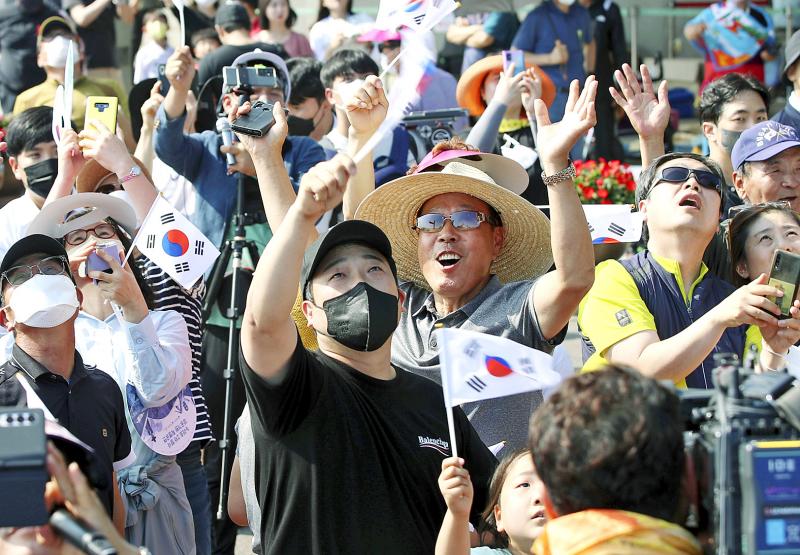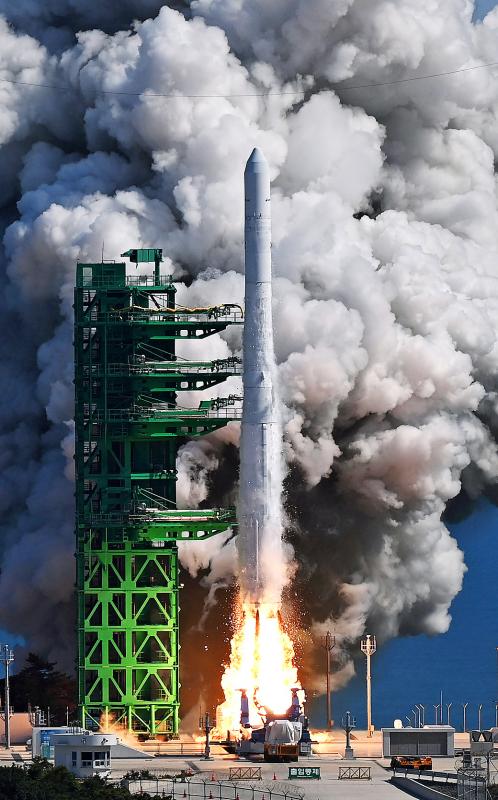South Korea yesterday said it had successfully launched its homegrown space rocket and placed a payload into orbit in a “giant leap” for the nation’s quest to become an advanced space-faring nation.
The Korea Satellite Launch Vehicle II, nicknamed Nuri and emblazoned with the South Korean flag, lifted off at 4pm from the launch site in Goheung on the southern coast, trailing a column of flame.
All three stages of the rocket worked, taking it to its target altitude of 700km, and it successfully separated a performance verification satellite and put it into orbit, Seoul said.

Photo: AP
South Korea’s space program “has taken a giant leap forward,” South Korean Minister of Science and Technology Lee Jong-ho said, declaring the mission a success.
“South Korea has now become the seventh nation in the world to launch a space vehicle with homegrown technology,” he said, adding that the government would continue its quest to become “an advanced space-faring nation.”
South Korea plans to launch a moon orbiter in August, he added.

Photo: EPA-EFE
Yesterday was South Korea’s second test launch of its homegrown space rocket: In the first test in October last year, all three stages of the rocket worked with the vehicle reaching an altitude of 700km and a 1.5-tonne payload separating successfully.
However, it failed to put a dummy satellite into orbit after the third-stage engine stopped burning earlier than scheduled.
In addition to a dummy satellite, Nuri yesterday carried a rocket performance verification satellite and four cube satellites developed by four local universities for research purposes.
The three-stage Nuri rocket has been a decade in development at a cost of 2 trillion won (US$1.5 billion). It weighs 200 tonnes and is 47.2 m long, fitted with six liquid-fueled engines.
In Asia, China, Japan and India all have advanced space programs, and the South’s nuclear-armed neighbor, North Korea, was the most recent entrant to the club of countries with their own satellite launch capability.
Ballistic missiles and space rockets use similar technology and Pyongyang put a 300kg satellite into orbit in 2012 in what the US condemned as a disguised missile test.
South Korea becomes the seventh nation — not including North Korea — to have successfully launched a 1 tonne payload on their own rockets.
The South Korean space program has a mixed record — its first two launches in 2009 and 2010, which in part used Russian technology, both ended in failure. The second one exploded two minutes into the flight, with Seoul and Moscow blaming each other.
A 2013 launch succeeded, but still relied on a Russian-developed engine for its first stage.
“The fact that we now have our own space rocket means we will be able to test and verify technologies needed for space exploration projects down the road,” Bang Hyo-choong, professor of aerospace engineering at Korea Advanced Institute of Science and Technology, told Yonhap News Agency.
Yesterday’s test looks set to bring South Korea closer to achieving its space ambitions, including a plan to land a probe on the Moon by 2030.
South Korea plans to conduct four more such test launches by 2027.

‘IN A DIFFERENT PLACE’: The envoy first visited Shanghai, where he attended a Chinese basketball playoff match, and is to meet top officials in Beijing tomorrow US Secretary of State Antony Blinken yesterday arrived in China on his second visit in a year as the US ramps up pressure on its rival over its support for Russia while also seeking to manage tensions with Beijing. The US diplomat tomorrow is to meet China’s top brass in Beijing, where he is also expected to plead for restraint as Taiwan inaugurates president-elect William Lai (賴清德), and to raise US concerns on Chinese trade practices. However, Blinken is also seeking to stabilize ties, with tensions between the world’s two largest economies easing since his previous visit in June last year. At the

UNSETTLING IMAGES: The scene took place in front of TV crews covering the Trump trial, with a CNN anchor calling it an ‘emotional and unbelievably disturbing moment’ A man who doused himself in an accelerant and set himself on fire outside the courthouse where former US president Donald Trump is on trial has died, police said yesterday. The New York City Police Department (NYPD) said the man was declared dead by staff at an area hospital. The man was in Collect Pond Park at about 1:30pm on Friday when he took out pamphlets espousing conspiracy theories, tossed them around, then doused himself in an accelerant and set himself on fire, officials and witnesses said. A large number of police officers were nearby when it happened. Some officers and bystanders rushed

Beijing is continuing to commit genocide and crimes against humanity against Uyghurs and other Muslim minorities in its western Xinjiang province, U.S. Secretary of State Antony Blinken said in a report published on Monday, ahead of his planned visit to China this week. The State Department’s annual human rights report, which documents abuses recorded all over the world during the previous calendar year, repeated language from previous years on the treatment of Muslims in Xinjiang, but the publication raises the issue ahead of delicate talks, including on the war in Ukraine and global trade, between the top U.S. diplomat and Chinese

RIVER TRAGEDY: Local fishers and residents helped rescue people after the vessel capsized, while motorbike taxis evacuated some of the injured At least 58 people going to a funeral died after their overloaded river boat capsized in the Central African Republic’s (CAR) capital, Bangui, the head of civil protection said on Saturday. “We were able to extract 58 lifeless bodies,” Thomas Djimasse told Radio Guira. “We don’t know the total number of people who are underwater. According to witnesses and videos on social media, the wooden boat was carrying more than 300 people — some standing and others perched on wooden structures — when it sank on the Mpoko River on Friday. The vessel was heading to the funeral of a village chief in